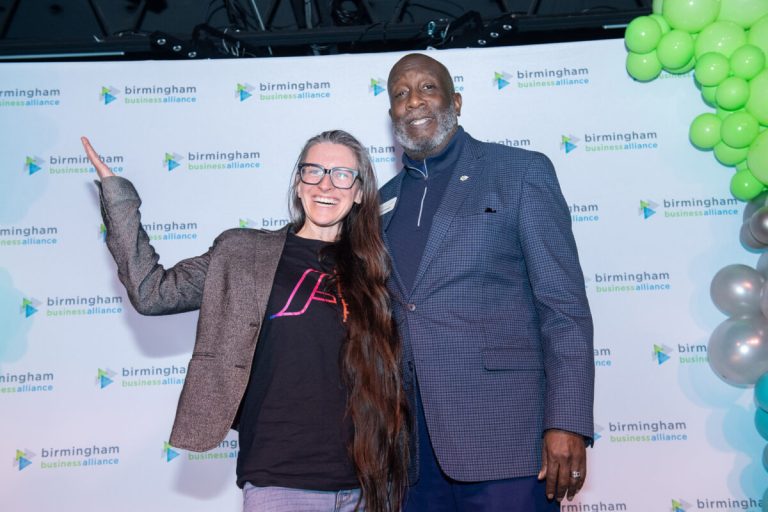A national report ranked Birmingham-Hoover women entrepreneurs’ earnings # 2 in the country: challenges + how UAB can help
Reading time: 5 minutes

Back in June, Volusion, an Austin, Texas-based company helping people sell online since 1999, published “Cities with the Most Successful Female Entrepreneurs.” Birmingham-Hoover ranked #2 among large metros with the most successful women entrepreneurs. We talked to Patrick J. Murphy, Director of the Entrepreneurship Program in the Collat School of Business at the University of Alabama at Birmingham to learn more.
Volusion’s key stats for women entrepreneurs in the Birmingham-Hoover area

Volusion’s definition of full-time female entrepreneurs is self-employed workers in their own incorporated or unincorporated businesses. They took data from the US Census and Bureau of Economic Analysis.
- Birmingham-Hoover area median income for:
- full-time female entrepreneurs (adjusted for cost of living): $56,351
- full-time female entrepreneurs (actual): $50,040
- for all full-time female workers (actual): $42,000
- Percentage of female workers who are entrepreneurs: 5.2%
Two key barriers women entrepreneurs everywhere face, according to UAB’s Patrick J. Murphy

Patrick J. Murphy, Ph.D., came to UAB from Chicago, where he built a career researching, teaching and helping to build the entrepreneurial ecosystem. We spoke about some of the challenges women entrepreneurs face, whether they’re in Birmingham, Brooklyn or Berkeley.
While these comments relate more to women in tech than, say, real estate or hair, there are useful points for any woman who’s working to rock her own biz. Also, they’re based on solid academic research, not opinions.
Perceptions of legitimacy + the importance of fighting back

There’s a subtle perception, according to Murphy, dating back to Antebellum America, that female leaders don’t have the same kind of expertise as their male counterparts.
This comes out in funding decisions, for example, with women tech founders. If you were to put two identical ventures side by side, one led by a woman and a man, he said, they would face different responses:
The posture towards the man will be like “Go get ‘em. Why aren’t you doing more?” For the woman, “are you sure you’re up for this? Are you sure you’re ready?”
The good news is that progress is happening, according to Murphy.
In fact, Birmingham’s own Mixtroz is becoming a leader in showing others how to fight back. Back in January 2020, they took part in a seminar for entrepreneurial educators in New Orleans. Not only did they talk about their venture and the hurdles they’ve faced, but they visited classes and taught others how to combat this perception bias.
For entrepreneurs who may be facing similar challenges, it’s empowering to see examples of others who can “hit back.” For example, “You’re talking about my identity, but let’s talk about the things that matter to my business.” Oooh, snap.
A second barrier—especially for women in tech: “do you really know how it works?”
Murphy said men will often be met with a sense of “okay, we might take a chance on you. I’ll give you a chance to prove me wrong. Come on, tear it up.” Women get “do you really know how this works?”
With the backing of an expert mentor, a woman founder can answer “Absolutely. X well-known expert believes 💯 in what we are doing.”
Mentors make a big difference

The most important way to combat the “legitimacy” barrier is with mentors, according to Murphy. Doesn’t matter if the mentor is male or female—they just need to be someone who’s established or has made their name in a particular sector or community.
Murphy says an expert mentor who’s listed as an advisor to your company and that you talk with frequently is the most important external asset a female entrepreneur can be armed with.
UAB’s new entrepreneurship major will help the entrepreneurial ecosystem, even beyond UAB students

According to Murphy, “Birmingham itself, in the context of the Southern Region, is almost like a mecca.”
“By any standard, what people are doing here with respect to women, underserved minority groups, relatively speaking, is pretty good. If you want to bust out, arrive and challenge any narrative, this is the place in our state to be. There is something about the ecosystem culturally that’s worth being proud of. The way people view entrepreneurship and who can be entrepreneurs is world class.”
Patrick J. Murphy, Ph.D.
UAB is growing into a place that can serve as a sounding board, a place where entrepreneurs can vent, and a place that can talk to people on your behalf if and when necessary.
They’re getting ready to launch a new entrepreneurship major this fall, and it will be embedded right into the core operations of the business school.
“It allows us to really create a program that puts students into a deep 3-4 year track of educational experience where they can become entrepreneurs.”
This will be unique in the domain of business studies, vs. accounting, finance, management—things that usually lend themselves to corporate career tracks.
“We are talking about young people making their own way. Immigrants and outsiders tend to become entrepreneurs at a higher percentage rate.”



